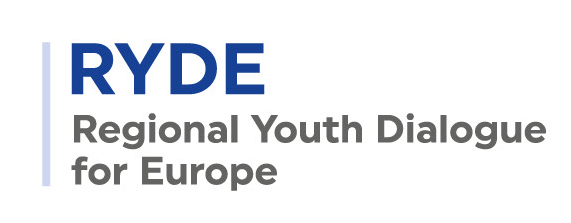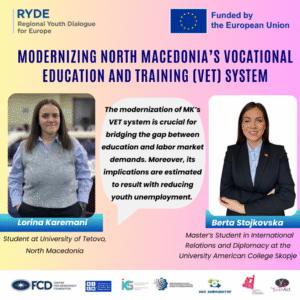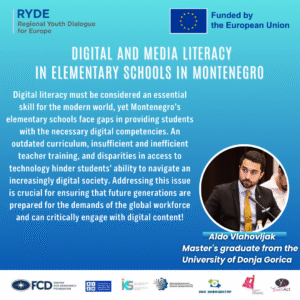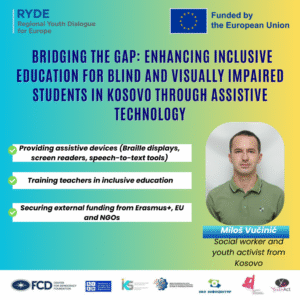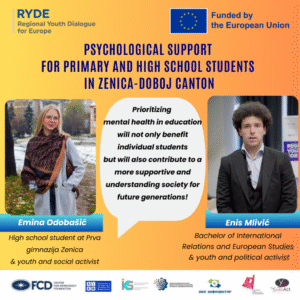Project: Regional Youth Dialogue for Europe (RYDE)
The Western Balkans, a region known for its complex socio-political history, is currently navigating a crucial period of transformation as it moves towards greater European integration. However, amidst the modernization processes, there are significant attempts to retraditionalize gender roles. These efforts often stem from conservative and nationalist movements that advocate for a return to patriarchal norms. In this blog, the dynamics of this retraditionalization trend is explored across the six Western Balkan countries—Albania, Bosnia and Herzegovina, Kosovo, Montenegro, North Macedonia, and Serbia—and the importance of countering these attempts to ensure continued progress on gender equality is discussed.
The Rise of Retraditionalization in the Western Balkans
In many parts of the Western Balkans, efforts to retraditionalize gender roles are gaining traction. These efforts are often driven by political and religious leaders who promote traditional gender norms as part of national identity and cultural heritage. Such norms typically emphasize women’s roles as caregivers, mothers, and homemakers, relegating them to the private sphere while men dominate the public space as breadwinners and leaders.
The push towards retraditionalization in the region is closely linked to broader political movements that focus on nationalism, religion, and conservative values. This trend can be seen as a reaction to the liberalization and democratization processes that have taken place in the post-socialist era, as well as the region’s aspirations for EU membership, which often require the adoption of more progressive gender policies.
Despite differences in the specific political and cultural contexts of the six countries, common themes emerge when examining the retraditionalization of gender roles across the Western Balkans.
Albania: Balancing Tradition and Modernity
Albania has made notable strides in promoting gender equality, particularly through the adoption of laws and policiesaligned with EU standards. The country has implemented legal frameworks addressing domestic violence, women’s participation in politics, and gender-based discrimination. However, retraditionalization pressures persist, particularly in rural areas where patriarchal norms remain deeply entrenched.
A significant challenge in Albania is the role of traditional family structures, where women are expected to prioritize their roles as wives and mothers. This cultural expectation is reinforced by conservative religious leaders who advocate for a return to “family values.” Moreover, Albania’s growing influence of religious groups, particularly after the fall of communism, has created tension between gender equality and traditional beliefs.
To counter these pressures, the Albanian government and civil society must continue to emphasize the importance of gender equality in both urban and rural areas, ensuring that women have access to education, employment, and decision-making roles.
Bosnia and Herzegovina: The Legacy of War and Patriarchy
In Bosnia and Herzegovina, the post-war period has seen a resurgence of traditional gender roles, particularly within nationalist discourses. The country’s complex ethno-political landscape has fostered a culture of conservatism that prioritizes patriarchal values, often using religion and tradition to justify women’s subordination.
The legacy of the 1990s war continues to shape gender roles in Bosnia. During the war, women were largely seen as victims or caretakers, and post-war reconstruction efforts did little to challenge these perceptions. As a result, there is significant pressure on women to conform to traditional roles, particularly within conservative, nationalist communities.
Efforts to counter retraditionalization in Bosnia have been led by civil society organizations, many of which focus on empowering women and promoting gender equality. These organizations work to challenge patriarchal norms by advocating for women’s rights in politics, the economy, and social life. However, the political stalemate in the country often hinders the implementation of more progressive gender policies.
Kosovo: A Struggle for Gender Equality Amidst Conservatism
Kosovo, the youngest country in the Western Balkans, has made significant progress in promoting women’s rights and gender equality. The country has enacted laws to prevent gender-based violence and promote women’s participation in public life. However, Kosovo faces considerable retraditionalization pressures, particularly from conservative religious groups.
The influence of religion, particularly Islam, has grown in Kosovo since the country gained independence in 2008. Conservative religious leaders often promote traditional gender roles, emphasizing women’s responsibilities within the home and family. This retraditionalization trend is especially pronounced in rural areas, where access to education and employment opportunities for women remains limited.
To counter these pressures, the Kosovar government and international organizations must continue to support women’s empowerment initiatives and ensure that gender equality is prioritized in both policy and practice.
Montenegro: A Conservative Backlash
Montenegro is witnessing a conservative backlash against gender equality efforts, with attempts to retraditionalize gender roles becoming more visible in recent years. Although the country has implemented progressive gender policies, these efforts have been met with resistance from conservative groups.
In Montenegro, traditional gender roles are often promoted as part of the country’s cultural and national identity. Conservative politicians and religious leaders have criticized gender equality initiatives, arguing that they undermine traditional family structures. This backlash is particularly evident in the country’s media, where women are often portrayed in stereotypical gender roles or through their gender.
Civil society organizations in Montenegro play a crucial role in countering this conservative backlash. These organizations work to challenge patriarchal norms by advocating for women’s rights and promoting gender equality in both public and private spheres.
North Macedonia: Progressive Policies vs. Traditional Norms
North Macedonia has made significant progress in promoting gender equality, particularly through its legal framework. However, like other countries in the region, North Macedonia faces challenges in countering attempts to retraditionalize gender roles.
In rural areas of North Macedonia, traditional gender roles remain deeply ingrained, with women expected to prioritize their responsibilities within the family over their careers or public life. Gender roles contribute to occupational segregation in rural areas, where women often work longer hours than men, with a significant portion of their labor being unpaid. Additionally, women face a substantial gender gap in property ownership and decision-making, with only 28% owning property and less than 10% taking leadership roles in land-related decisions, further exacerbating their economic vulnerability.
Despite these challenges, North Macedonia’s civil society organizations (CSOs) have played a crucial role in promoting gender equality and advancing women’s rights, achieving significant progress, especially in areas like women’s political empowerment and the empowerment of rural women. Women’s organizations have been key in advocating for critical legal reforms, such as amendments to the Electoral Code and the ratification of the Istanbul Convention, while approximately 40% of CSO networks in North Macedonia address gender equality either directly or as part of broader efforts in democracy, rule of law, and social protection.
Serbia: A Battleground for Gender Equality
Serbia has long been a battleground for gender equality, with progressive forces advocating for women’s rights and conservative groups pushing for a return to traditional gender roles. In recent years, Serbia has seen a rise in nationalist and conservative movements that promote patriarchal values, often using religion and traditional family structures to justify women’s subordination.
The Serbian Orthodox Church plays a significant role in promoting traditional gender roles, particularly through its influence on political and social life. Conservative politicians have also embraced these views, framing gender equality initiatives as a threat to traditional family values and national identity.
To counter these conservative forces, women’s rights organizations in Serbia have been at the forefront of promoting gender equality. However, the political environment and funding limitations in Serbia have strained women’s civil society networks, with government attitudes leading to decreased funding for women’s CSOs since 2010. As a result, new government-affiliated organizations with no prior expertise have been funded to fill the service delivery gap, bypassing established criteria for funding allocation. In addition, the rise of nationalist and conservative rhetoric in the country continues to pose a significant challenge.
Commonalities and Differences Across the Region
In the Western Balkans, conservative political and religious leaders in some countries promote traditional gender roles, either directly or indirectly, as part of national identity and cultural heritage. While this is more pronounced in certain contexts, such as during nationalist political campaigns or religious sermons, it does not occur uniformly across all countries or settings. In some instances, traditional gender roles are emphasized, while in others, there may be more progressive approaches or a blend of both, depending on the political and cultural dynamics at play.
In countries like Albania and Kosovo, religious conservatism plays a more prominent role in promoting traditional gender norms, while in Bosnia and Herzegovina and Serbia, nationalist discourses are more influential. In Montenegro and North Macedonia, the backlash against gender equality is closely linked to cultural and national identity, with traditional family values being promoted as part of the country’s heritage.
Building a Progressive Future: Strategies to Overcome Gender Retraditionalization in the Western Balkans
Countering retraditionalization in the Western Balkans requires a comprehensive approach that tackles both the cultural and structural foundations of this trend. Strengthening legal frameworks that promote gender equality and effectively addressing violations like gender-based violence are critical steps. Support for women’s rights organizations and civil society groups is equally important, as these organizations are at the forefront of challenging patriarchal norms. Governments and international bodies must prioritize funding and capacity-building initiatives for these groups to ensure sustained progress.
Additionally, education and public awareness campaigns are vital in changing societal attitudes towards gender roles, especially in schools and universities. Engaging with conservative religious and political leaders can foster dialogue on promoting gender equality within traditional frameworks, while regional cooperation allows Western Balkan countries to share strategies and best practices. Through these efforts, the region can resist retraditionalization and continue advancing towards a more inclusive, gender-equal society as part of its European integration goals.
Author: Daniel Lazarević, NGO representative
* The production of this blog was financed by the European Union. Its content is the sole responsibility of the Network of Progressive Initiative and does not necessarily reflect the views of the European Union.
